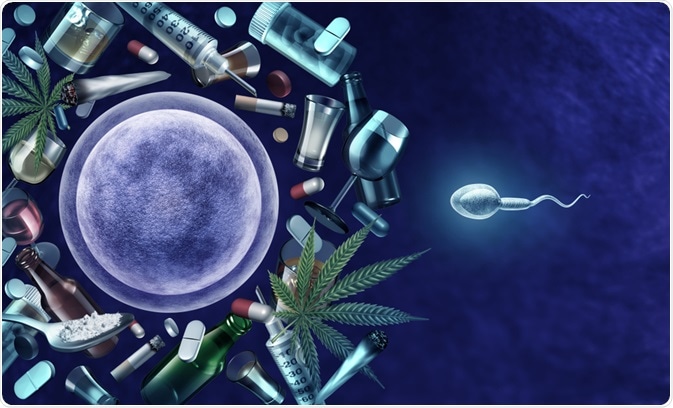According to a 2015 Survey on Drug Use and Health, 52.5% of men of reproductive age reported that they had used cannabis at some point during their lives.
 Image Credit: Lightspring / Shutterstock.com
Image Credit: Lightspring / Shutterstock.com
With this statistic in mind, combined with the knowledge that human offspring can succumb to adverse neurodevelopmental effects as a result of parental cannabis use, a group of researchers from Duke University recently investigated the mechanisms by which cannabis use can alter sperm DNA.
Cannabis Effects on Offspring
As the legalization of cannabis continues to spread across the United States and Europe, there has been a subsequent rise in the prevalence of cannabis use in these areas. Furthermore, cannabis potency has risen from approximately 4% to as much as 32% as a result of more lenient legislation in these areas.
This rise in cannabis use has led many individuals to perceive this drug as less risky, despite many studies that have confirmed the ability of cannabis to cause various health effects.
For example, prenatal cannabis exposure, in particular, is a rising health concern. Some of the most concerning outcomes of offspring born to mothers who used cannabis at some point during their pregnancy include decreased infant birth weight, a greater likelihood of the infant to require care in the neonatal intensive care unit (NICU), altered fetal immune system development and certain adverse neurodevelopmental effects.
Cannabis Use and Altered Sperm Integrity
Although many teratogenic studies typically focus on how various environmental conditions can alter in utero development of the fetus, there is a general lack of research investigating how the exposure history of the father can alter his sperm epigenome.
While some studies have investigated how exposure to phthalates and pesticides, as well as nutritional deficiencies and obesity of the falter, can induce heritable changes within the sperm epigenome, there remains limited information as to how exposure to other chemicals can cause similar genomic effects.
Recent work conducted at Duke University found that when male rats were exposed to delta-9-tetrahydrocannabinol (THC), they exhibited decreased sperm concentrations that were accompanied by various changes in sperm DNA methylation. These findings were further confirmed when analyzing the sperm samples of men who also used cannabis.
Upon further analysis of the human sperm samples, the researchers found 17 differentially methylated CpG sites of the DLGAP2 gene, which is a membrane-associated protein that plays a rule in neuronal signaling and synapse organization of neurons. In fact, DLGAP2 was just one of the 46 genes that were found to exhibit over 10 CpG sites of altered DNA methylation status.
Altered DLGAP2 Effects
In an effort to better understand the relationship that exists between cannabis consumption and altered gene expression of DLGAP2 in male sperm, the sperm of both THC-exposed rats and male cannabis users were further inspected. DLGAP2 is one of the many DLGAP scaffolding proteins present in the post-synaptic density (PSD) of neurons that play a role in facilitating excitatory glutamatergic signaling pathways in the central nervous system (CNS).
When DLGAP2 expression is altered, a wide range of severe health effects can follow, some of which include schizophrenia, autism, abnormal social behavior, increased aggression, and various learning disabilities.
When analyzing the methylation-expression of both rat and human sperm samples, the researchers confirmed that the DLGAP2 gene was differentially methylated to a much greater extent in both THC-exposed rats and cannabis-using male subjects as compared to controls.
Sources
- Schrott, R., Acharya, K., Itchon-Ramos, N., Hawkey, A. B., Pippen, E., et al. (2019). Cannabis use is associated with potentially heritable widespread changes in autism candidate gene DLGAP2 DNA methylation in sperm. Epigenetics. DOI: 10.1080/15592294.2019.1655158.
Further Reading
Last Updated: Nov 20, 2019